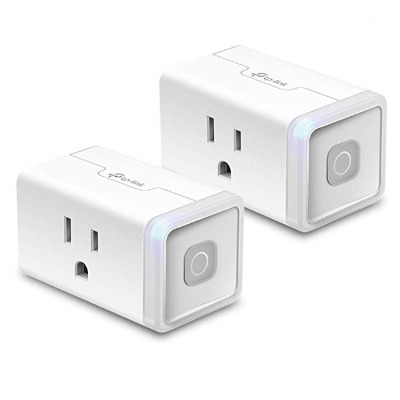Following previous pledges to support HomeKit in its Kasa range, TP-Link has now revealed that its popular accessory will not be updated to work with Apple's system.
Electronics manufacturer TP-Link will no longer bring HomeKit support to its Kasa Smart Plug Mini. Previously, the company had promised support when unveiling the range at CES in January 2019. At the same time, the company had also claimed that existing devices would be updated to work with HomeKit early in the year. However, following months of delays, TP-Link has now cancelled plans to support Apple's system.
The news has not been formally announced, but rather was spotted by a Reddit user in a company support FAQ document.
"Due to changes in our roadmap, the Kasa Smart Plug Mini (HS105) smart plug will not offer support for Apple HomeKit," says TP-Link's document.
"Despite the change in direction for this specific SKU," it continues, "our team is committed to the development of innovative smart home solutions that will continue to delight our customers around the globe."
The Kasa Smart Plug Mini was going to be a significant boost to HomeKit because of the company's deals with Amazon. The retailer periodically offered the plug for only $15 when bought with an Echo speaker, so Amazon's rival system would actually have brought HomeKit into more homes.
It's not known yet whether the company is abandoning HomeKit for all devices or solely for this one product. Nor are there any details about whether there will be any recourse for customers who bought the Kasa Smart Plug Mini in the expectation that HomeKit was coming.
AppleInsider has reached out to TP-Link for more details.
 William Gallagher
William Gallagher








 Charles Martin
Charles Martin
 Mike Wuerthele
Mike Wuerthele
 Marko Zivkovic
Marko Zivkovic
 Malcolm Owen
Malcolm Owen



 Amber Neely
Amber Neely

-m.jpg)






44 Comments
Pre-announcing HomeKit support is a well-worn marketing device for IoT manufacturers that have little, if any, intention to deliver.
At this stage it’s fair to label such companies as frauds, because there have been enough companies that had struggled or scaled back their HomeKit intentions to give pause to anyone that wants to legitimately launch such a feature.
Be wary of buying anything based on a promised future upgrade.
I have seven TP-Link smart plugs and three of their smart bulbs. So far the setup and app (Android and iOS) have been fairly stable. Without a Google Home device however, Google Assistant set-up can be really troublesome. Almost as if Google deliberately hides the option hoping you will opt for a Google Home product. They are also Alexa certified but I don't have any Echo devices.
They are only 2.4Ghz and for some reason, the option for 'remote' control was dropped from the app so I think that feature is permanently 'on' now.
Overall, they have worked well but I have had to re-pair a couple of the plugs.
Of course, the real issue is how long they will be supported because without the app the whole set-up will fail and if they get hacked or suffer some kind of major outage it might be a major inconvenience.
Very good. You don’t need to surrender your Wi-Fi password to Kasa Smart whose servers are hosted in the Communist Party China.